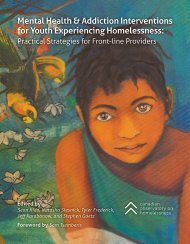Without A Home: The National Youth Homelessness Survey
Create successful ePaper yourself
Turn your PDF publications into a flip-book with our unique Google optimized e-Paper software.
5.3 <strong>The</strong> Need to Help Young People Make Rapid<br />
Exits from <strong>Home</strong>lessness<br />
Research on youth homelessness has consistently identified that when young people become<br />
and remain homeless for an extended period, they experience increasingly negative outcomes<br />
in terms of their housing stability, health and well-being, mental health, addictions, and safety.<br />
Moreover, life on the streets means that staying in school or maintaining employment are very<br />
challenging. <strong>The</strong> outcome for many young people in this situation is further entrenchment in<br />
street life, making it more challenging for them to exit homelessness.<br />
<strong>The</strong> data from our <strong>Without</strong> a <strong>Home</strong> study confirm a number of these findings:<br />
• Ongoing housing instability – Many young people in our study<br />
reported considerable housing instability prior to their current experience<br />
of homelessness. For many, this instability continues once they are on the<br />
streets. Over half of respondents reported that they had stayed in more than<br />
one location the previous month, and 10.2% stayed in more than five places.<br />
Lack of housing stability means continuing chaos for youth, undermining<br />
their ability to care for themselves, stay in school or work, and access the<br />
supports needed to move off the streets.<br />
• Nutritional vulnerability – Many young people who are homeless do<br />
not get enough food to meet their basic nutritional needs. While 26.8% report<br />
having access to good quality food when they need it, almost half (46.3%)<br />
experience this once a week or less. One of the consequences of this is that<br />
when asked if they have enough energy for everyday life, one third (34.7%)<br />
reported that they have little or no energy on a day-to-day basis. This low<br />
energy undoubtedly has a significant impact on young people’s ability to work,<br />
go to school, maintain healthy relationships, and move forward in their lives.<br />
• Declining mental health – A very high percentage of respondents<br />
(85.4%) reported high symptoms of distress, which would, if they were<br />
housed, put them in a range midway between inpatient and outpatient<br />
psychiatric care levels. Within our sample, 42% of participants reported at least<br />
one suicide attempt and 35.2% reported having at least one drug overdose<br />
requiring hospitalization. While young people with childhood experiences<br />
of trauma and distress often arrive on the streets with serious mental health<br />
challenges, prolonged experiences of homelessness greatly increases the risk<br />
WITHOUT A HOME: THE NATIONAL YOUTH HOMELESSNESS SURVEY<br />
99

















